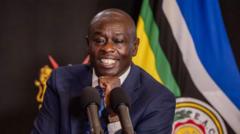Kenya is witnessing a landmark moment as Deputy President Rigathi Gachagua undergoes an impeachment trial, instigated by serious accusations such as corruption and inciting ethnic tensions. Despite Gachagua's denial of these charges, his recent fallout with President William Ruto adds complexity to the proceedings. The trial is notably taking place in the full Senate after the Senate abandoned plans to establish an investigative committee, reflecting the political intensity surrounding the case. Analysts predict the deputy president's removal, anticipating that ruling party senators will again secure opposition support, as occurred in the National Assembly vote.
The impeachment trial commenced with charges and opening statements, following which evidence from the National Assembly will be presented and scrutinized. Thursday’s session will focus on Gachagua’s defense. The Senate is set to vote on Thursday night, though an extension to Friday remains a possibility. A two-thirds majority is required to finalize Gachagua's removal, carrying significant implications for his political career. Gachagua, a pivotal figure from the economically vibrant Mount Kenya region, has already filed numerous legal challenges against the impeachment, all unsuccessful thus far.
Allegations against Gachagua include amassing $40 million through corruption since assuming office, claims he counters with explanations related to his late brother's estate. His swift political ascent from a first-time MP to deputy president underscores his influence. The trial's timing coincides with Kenya’s economic challenges and recent protests, diverting attention from pressing public issues. As the proceedings unfold, many citizens remain focused on the economic woes and broader political landscape reshaped by the tensions between Gachagua and Ruto.
The impeachment trial commenced with charges and opening statements, following which evidence from the National Assembly will be presented and scrutinized. Thursday’s session will focus on Gachagua’s defense. The Senate is set to vote on Thursday night, though an extension to Friday remains a possibility. A two-thirds majority is required to finalize Gachagua's removal, carrying significant implications for his political career. Gachagua, a pivotal figure from the economically vibrant Mount Kenya region, has already filed numerous legal challenges against the impeachment, all unsuccessful thus far.
Allegations against Gachagua include amassing $40 million through corruption since assuming office, claims he counters with explanations related to his late brother's estate. His swift political ascent from a first-time MP to deputy president underscores his influence. The trial's timing coincides with Kenya’s economic challenges and recent protests, diverting attention from pressing public issues. As the proceedings unfold, many citizens remain focused on the economic woes and broader political landscape reshaped by the tensions between Gachagua and Ruto.

















